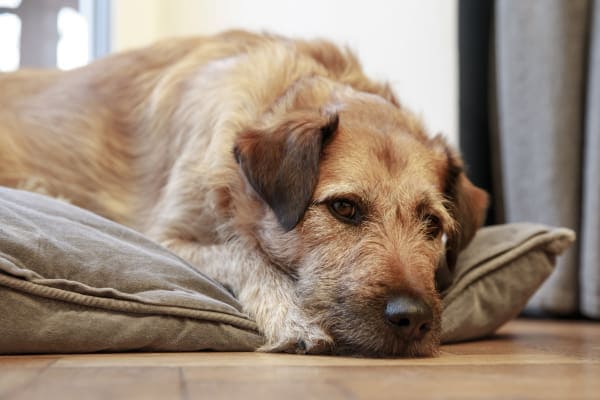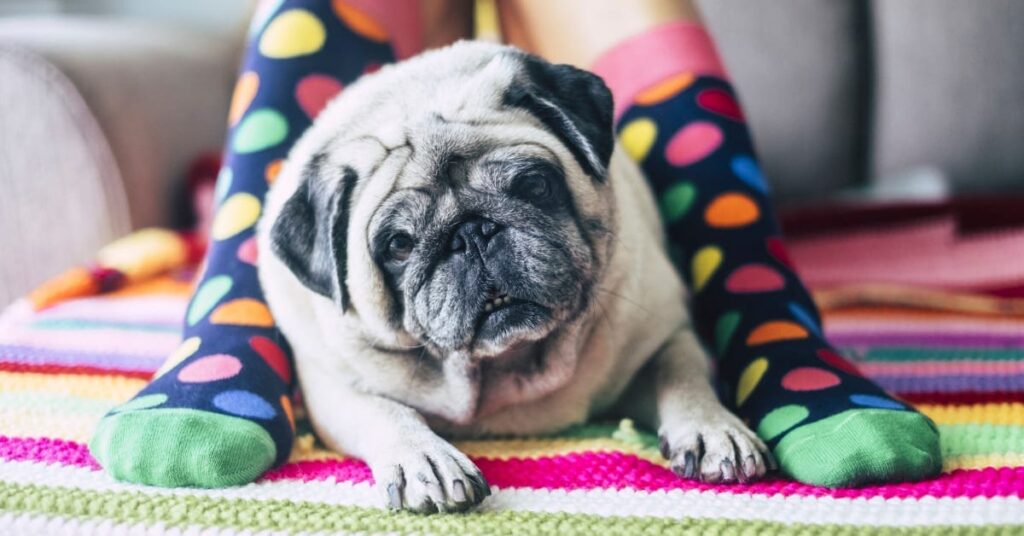My Dog Is Acting Drunk And Wobby Suddenly.
Has your furry friend suddenly become a disco dancer, stumbling and swaying like they’ve had one too many dog treats? Seeing your dog act “drunk” can be a scary and confusing experience. Don’t worry, paw-tner, you’re not alone! This wobbly walk, known as ataxia, can be caused by various factors, some more serious than others.
In this blog post, we’ll dive into the world of canine clumsiness, exploring the possible causes behind your dog’s sudden disorientation. We’ll discuss what to do when your pup starts acting “drunk,” from initial steps at home to seeking professional help. We’ll also shed light on potential prognoses and how to support your wobbly friend on the road to recovery.
Why Is My Dog Acting Drunk All Of A Sudden?

Here are some potential reasons why your dog might be acting drunk:
Balance issues (ataxia): This is a broad term for uncoordinated movement and can be caused by various factors, including:
- Vestibular disease: This affects the inner ear and brain areas responsible for balance. It can be idiopathic (unknown cause) or caused by infections, tumors, or trauma.
- Inner ear infections: These can affect balance and cause head tilting, stumbling, and other symptoms.
- Neurological problems: Strokes, tumors, and other neurological issues can affect balance and coordination.
- Spinal problems: Injuries or diseases affecting the spine can cause weakness and wobbliness.
Toxins: Ingestion of poisonous substances, such as antifreeze, medications, or certain plants, can cause neurological symptoms like ataxia.
Other medical conditions: Hypoglycemia (low blood sugar), electrolyte imbalances, and certain organ diseases can also cause wobbliness and other symptoms.
It’s crucial to seek veterinary help immediately to accurately diagnose the cause of your dog’s behavior and get them the necessary treatment. The veterinarian will likely perform a physical examination, neurological assessment, and possibly blood tests or other diagnostics to determine the underlying issue.
What Are Some Possible Causes For Vestibular Dysfunction In Dogs?

Several potential causes can lead to vestibular dysfunction in dogs, affecting their balance and coordination. Here are some of the most common:
Inner and Middle Ear Issues:
- Ear infections: Deeply seated infections that reach the inner or middle ear can damage structures crucial for balance.
- Ruptured eardrum: Trauma or severe infections can cause the eardrum to break, impacting the inner ear and leading to vestibular dysfunction.
- Tumors or polyps: Growths within the ear canal or middle ear can impinge on nerves or structures involved in balance.
- Vestibular neuritis: Inflammation of the vestibular nerve, which transmits balance information to the brain, can cause sudden-onset vestibular dysfunction.
Neurological Causes:
- Idiopathic vestibular syndrome: This common cause, particularly in older dogs, has no identifiable underlying reason and often resolves on its own.
- Brain tumors or inflammation: Masses or inflammatory processes in the brain stem or cerebellum, areas responsible for balance control, can manifest as vestibular dysfunction.
- Stroke: Similar to humans, strokes in dogs can affect brain regions involved in balance, leading to wobbly gait and head tilts.
Other Potential Causes:
- Hypothyroidism: This hormonal imbalance can sometimes cause neurological symptoms, including balance issues.
- Trauma: Head injuries or accidents can damage structures related to balance.
- Certain medications: Some medications, like aminoglycoside antibiotics, can have ototoxic effects and damage the inner ear.
- Toxins: Ingestion of poisonous substances can affect the nervous system and cause vestibular dysfunction.
How Is Vestibular Dysfunction Treated In Dogs?
The treatment for vestibular dysfunction in dogs depends on the underlying cause. Here’s a breakdown of potential approaches:
Supportive Care:
- Monitoring: In many cases, especially idiopathic vestibular syndrome, the primary focus is monitoring your dog’s vital signs, hydration, and ability to eat and drink.
- Hydration: If your dog struggles to drink due to dizziness, intravenous fluids might be administered to prevent dehydration.
- Medication: Anti-nausea medication can help manage vomiting induced by the disorientation.
- Motion sickness medication: For some dogs, medication to manage motion sickness symptoms can provide relief.
- Environmental adjustments: Creating a safe, non-slip environment with easily accessible food, water, and bedding can aid their recovery.
Addressing the Underlying Cause:
- Ear infections: Antibiotics or other medications will be prescribed to combat the infection.
- Tumors or polyps: Depending on the type and location, surgical removal or other treatments might be recommended.
- Vestibular neuritis: Typically supportive care is sufficient, but medications like corticosteroids might be used in specific cases.
- Brain tumors or inflammation: Treatment depends on the type and severity, potentially involving surgery, radiation, or medication.
- Hypothyroidism: Thyroid hormone replacement therapy will be initiated.
- Trauma: Addressing underlying injuries might be necessary.
- Medication adjustments: If specific medications are suspected to contribute, alternatives might be explored.
- Toxins: Treatment depends on the specific toxin ingested.
Also Read: 8 Surprising Facts About Our Feline Friends
What To Do If Your Dog Is Acting Drunk And Wobby Suddenly
It’s very concerning to see your dog acting “drunk” or wobbly suddenly, as it can indicate a range of potential health issues. The most important step is to seek immediate veterinary attention. However, here are some initial steps you can take while waiting to see the vet:
1. Stay Calm and Assess the Situation:
- Don’t panic, but remain calm and focused on assessing your dog’s condition.
- Observe their behavior closely: are they stumbling, tilting their head, having difficulty walking, or displaying any other unusual signs?
- Note any recent changes in their behavior, appetite, or environment.
- Look for signs of injury, like wounds or swelling.
- Check if they have access to any potential toxins or medications they shouldn’t have ingested.
2. Keep Your Dog Safe:
- Move your dog to a safe, quiet, and enclosed area to prevent further injury.
- Remove any potential hazards like stairs, furniture, or sharp objects.
- Do not attempt to medicate your dog unless explicitly instructed by a veterinarian.
3. Contact Your Veterinarian Immediately:
- Call your veterinarian or emergency vet clinic right away and explain your dog’s symptoms.
- Inform them of any potential causes you suspect, medications your dog is on, and recent changes in their environment.
- Follow their instructions carefully until you can reach the clinic.
4. Prepare for Your Appointment:
- Gather any relevant information, including your dog’s medical history, recent vaccinations, and any medications they are taking.
- Write down a list of your observations and questions for the veterinarian.
- Take pictures or videos of your dog’s symptoms, if possible.
When To See A Vet For A Drunk Dog

It’s important to be aware of the signs that a vet could help your dog. For instance, if your dog won’t stop wobbling, or if they’re having any kind of seizures. If they are struggling to stay upright, refusing to eat, or vomiting, these are all signs that they could be suffering from an underlying condition and need a vet’s attention.
It’s also a good idea to see a vet if your dog is acting drunk and wobby for more than 24 hours. At this point, it’s possible that the cause could be something more serious, such as poisoning or a neurological disorder. Whatever the case may be, it’s important to get them checked out as soon as possible so you can get the help that your pup needs.
Conclusion
First, take a deep breath and try to remain calm. It’s important not to panic when your dog is acting drunk and wobby, as that will only make the situation worse.
Second, try to determine the cause of your dog’s sudden change in behavior. There are a number of things that could cause your dog to act drunk and wobbly, so it’s important to identify the cause as quickly as possible.
Once you know the cause, you can take the appropriate steps to help your dog recover. If your dog has consumed something toxic, for example, you may need to take him to the vet immediately.
Whatever the cause, don’t hesitate to seek help from a professional if you’re not sure how to deal with the situation. A qualified vet or dog behaviorist can help you get your dog back to his old self in no time.
FAQs About Drunk Dog Syndrome
1. What causes this behavior?
It could be anything from a medical condition like ethanol poisoning to an injury or underlying health issue. If your dog has been exhibiting these behaviors for more than 24 hours, it’s best to call your vet for advice.
2. Could it be a medication?
Dogs can be sensitive to certain medications and may have a reaction if they eat or drink something containing the drug. Always check with your vet if you suspect that a medication may be causing the symptoms. Additionally, contact poison control if your pup has ingested something toxic.
3. Is there a cure?
Treatment for drunk dog syndrome often depends on the underlying cause—it could range from simply monitoring their progress to hospitalization, depending on the severity of their symptoms.
